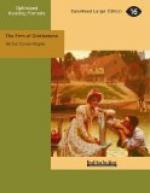For months before the great day there is bustle and stir. Secret committees meet, rules are formulated, and insidious agents prowl about with an eye to the political training of those who have not yet nailed their colours to any particular mast. Then comes a grand meeting of the Liberal Students’ Association, which is trumped by a dinner of the Undergraduates’ Conservative Society. The campaign is then in full swing. Great boards appear at the University gates, on which pithy satires against one or other candidate, parodies on songs, quotations from their speeches, and gaudily painted cartoons are posted. Those who are supposed to be able to feel the pulse of the University move about with the weight of much knowledge upon their brows, throwing out hints as to the probable majority one way or the other. Some profess to know it to a nicety. Others shake their heads and remark vaguely that there is not much to choose either way. So week after week goes by, until the excitement reaches a climax when the date of the election comes round.
There was no need upon that day for Dr. Dimsdale or any other stranger in the town to ask his way to the University, for the whooping and yelling which proceeded from that usually decorous building might have been heard from Prince’s Street to Newington. In front of the gates was a dense crowd of townspeople peering through into the quadrangle, and deriving much entertainment from the movements of the lively young gentlemen within. Large numbers of the more peaceable undergraduates stood about under the arches, and these quickly made a way for the newcomers, for both Garraway and Dimsdale as noted athletes commanded a respect among their fellow-students which medallists and honours men might look for in vain.
The broad open quadrangle, and all the numerous balconies and terraces which surround it, were crowded with an excited mob of students. The whole three thousand odd electors who stand upon the college rolls appeared to be present, and the noise which they were making would have reflected credit on treble their number. The dense crowd surged and seethed without pause or rest. Now and again some orator would be hoisted up on the shoulders of his fellows, when an oscillation of the crowd would remove his supporters and down he would come, only to be succeeded by another at some other part of the assembly. The name of either candidate would produce roars of applause and equally vigorous howls of execration. Those who were lucky enough to be in the balconies above hurled down missiles on the crowd beneath—peas, eggs, potatoes, and bags of flour or of sulphur; while those below, wherever they found room to swing an arm, returned the fusillade with interest. The doctor’s views of academical serenity and the high converse of pallid students vanished into thin air as he gazed upon the mad tumultuous scene. Yet, in spite of his fifty years, he laughed as heartily as any boy at the wild pranks of the young politicians, and the ruin which was wrought upon broad-cloth coat and shooting jacket by the hail of unsavoury projectiles.




